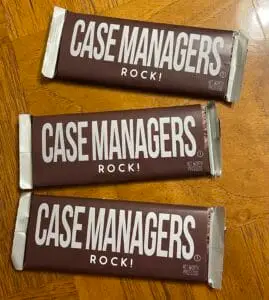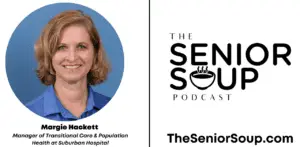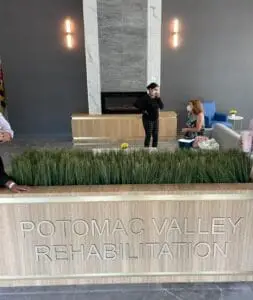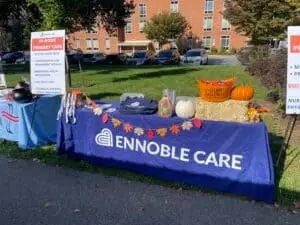The Senior Soup is excited to introduce its readers to the world of hospital case management teams and the vital role case manager teams play in helping patients during their inpatient stay.
When you or your loved one is admitted to the hospital, it can be a stressful and overwhelming experience.
That’s where hospital case management teams come into play.
Hospital case manager teams are dedicated professionals who work behind the scenes to ensure that patients receive the best possible care during their hospital stay.
Hospital case management teams coordinate and manage all aspects of a patient’s care, from admission to discharge.
They work closely with doctors, nurses, and other healthcare professionals to develop a comprehensive care plan that meets the patient’s needs and ensures a smooth transition from the hospital to home or another care facility.
Whether it’s arranging for medical equipment, coordinating follow-up appointments, or helping patients navigate complex insurance issues, hospital case management teams are there every step of the way to provide patients with support and guidance.
So, let’s dive in and explore what hospital case management teams do and how they can make a difference in the lives of patients and their families and improve patient outcomes.
What Is Hospital Case Management?
The American Case Management Association, the premier association for health care delivery system case management and transitions of care, defines case management as:
“A dynamic process that assesses, plans, implements, coordinates, monitors, and evaluates to improve outcomes, experiences, and value.”
Hospital case managers are primarily responsible for the following:
- Discharge Planning
- Utilization Review & Management
- Transitional Care & Population Health
According to the ACMA:
“The practice of case management is professional and collaborative, occurring in various settings where medical care, mental health care, and social support are delivered.
“Diverse disciplines facilitate services in conjunction with the care recipient and their support system. In pursuit of health equity, priorities include identifying needs, ensuring appropriate access to resources/services, addressing social determinants of health, and facilitating safe care transitions.”
“A professional case manager helps navigate complex systems to achieve mutual goals, advocate for those they serve, and recognize personal dignity, autonomy, and the right to self-determination.”
What Do Hospital Case Managers Do To Help You?
A recent accredited ACMA continuing education course teaches case managers three important fundamentals when planning a patient’s hospital stay and managing their discharge:
A Case Manager prepares for the day.
Your discharge planner or social worker will examine your comprehensive and immediate care needs and create an action plan.
Hospital case managers plan for your entire stay.
A case manager will always plan your entire hospital stay and anticipate your discharge date – and what comes next.
And case management teams plan for your way home.
Case managers will ensure you’re prepared when it’s time to go home.
They will help coordinate and arrange the appropriate healthcare services to ensure your recovery is successful at home.
Now you might wonder about the specifics of case management and the various components that make up a case management team.
What Is Hospital Discharge Planning?
Hospital discharge planners are often licensed clinical social workers, though they don’t have to be.
Social work is a vital component of discharge planning.
They conduct assessments and screenings when you arrive at the hospital. They can offer you counseling services and assist with behavioral health placements.
More importantly, discharge planners are responsible for examining your home living situation and are likely to determine whether or not you can safely and independently manage at home.
Discharge planners will consider the following when creating a hospital discharge plan:
- Does the patient live by themselves?
- What health insurance does the patient have?
- How are their labs?
- Is the patient recovering quickly from their illness?
- Will the patient require post-discharge rehabilitation services like in-home physical and occupational therapy?
- Did the patient arrive without a primary care provider?
- Will the patient benefit from home-based primary care like Ennoble Care?
- Could the patient benefit from hiring home care services?
Note: This list is not comprehensive.

What Is Utilization Review & Management?
A hospital utilization review specialist may help you secure a bed in a sub-acute skilled nursing facility or a respite stay at a nearby assisted living community.
Utilization review typically refers to the cost of health care services.
They evaluate your healthcare needs and communicate important information with your insurance company.
Moreover, they help determine whether your health insurance plan(s) cover the costs of your stay or emergency room visit.
And most importantly, utilization review and management specialists help their hospitals by keeping healthcare costs in check.
(CFOs love them.)
What Is Transitional Care & Population Health?
Transition case managers are responsible for helping you manage inside your home when you leave the hospital.
They help determine the levels of care you’ll need when you arrive home.
Typically a registered nurse is responsible for transitional care and population health.
You’ll likely see this person face-to-face. They’ll thoroughly review your discharge instructions with you and recommend what healthcare and another related service you may need to aid you in your recovery journey.
Transition case managers are also responsible for relaying information to your primary care doctor. Moreover, they’ll help you arrange specialized care with the appropriate outside medical professionals.
Think of transitional care as moving through the continuum of care after your hospital stay.
Suburban Hospital Case Management | Margie Hackett
Margaret “Margie” Hackett is a 36-year veteran of Suburban Hospital in Bethesda, Maryland, where she manages transitional care and population health.
She’s a registered nurse with a bachelor of science in nursing and gerontological nursing certification. She serves on the board of directors of the American Case Management Association – Maryland chapter.

Margie joined The Senior Soup Podcast during National Case Management Week 2022 (October 9-15, 2022) to offer advice on what to expect during an inpatient hospital stay – anywhere from when you arrive to when you leave and go back home.
You’re Leaving The Hospital And Going Home!
Are you ever fully prepared for a hospital stay?
Preparing in advance for a hospital stay can help you recover quickly, and it enables you to avoid readmission.
One of the best ways to prepare yourself is by schooling yourself on your local continuum of care options.
“To be safe, Margie says, “a patient must be able to walk independently.”
If a patient cannot walk, a case manager or social worker may refer them to a skilled nursing rehabilitation facility or arrange for an experienced home health care agency to provide them with in-home physical and occupational therapy.
Margie says a safe discharge also means you have “a willing, able, and available” caregiver ready to care for you when you come home.
A case manager may even recommend hiring a caregiver from a reputable home care agency.
The Best Bethesda Home Care Company
Hospital case managers at Suburban Hospital will only recommend the best home care agencies that are licensed, bonded, and insured.
If you live in Montgomery County, Maryland, you should look no further than the best Bethesda home care agency, Amada Senior Care.
Amada Senior Care specializes in companion care and long-term care insurance.
You can connect with Amada Senior Care’s owner, Raquel Micit, at (301) 701-3511 to learn more about the best home care in Bethesda, Md.
Additionally, hospital managers may decide to refer you or your loved one to a care management company, like Seabury Resources for Aging, to help oversee and manage your daily and weekly medical and care needs.
What If I Go To A Skilled Nursing Facility?
A skilled nursing facility (SNF for short) provides 24-hour nursing care and provides patients with rehabilitation support.
Margie recommends visiting a skilled nursing rehabilitation facility before an inpatient hospital stay and meeting the staff.
“Get to know them. Be comfortable around them. Don’t be scared walking in,” Margie said.
“Learn about their services and the level of care offered. Have lunch there. They want to show you what they can do…which is awesome,” she said.

And if you don’t have a good vibe about one of the rehabilitation centers you visit, Margie recommends visiting other SNFs – until you find the right fit.
Greg Strite, a regional business development director at Vita Healthcare Group, joined The Senior Soup Podcast in September 2022 and shared information about visiting a skilled nursing facility.
To learn more about Vita Healthcare Group’s skilled nursing facilities in the DMV area, please connect with Greg Strite.
Does Medicare pay for a stay at a skilled nursing rehabilitation facility?
Yes, Medicare will cover the total costs of your care at a skilled nursing facility – for up to 20 days, however.
- Day 1-20: You pay nothing.
- Day 21–100: Medicare covers all costs except the daily coinsurance for covered services. You are responsible for protecting the coinsurance.
- One hundred days and beyond: Medicare pays nothing; you are on the hook for all costs.
Click this link to read a detailed article about Medicare coverage published by the Centers for Medicare and Medicaid Services.
Contact your health insurance company if you don’t understand your coverage.
Do You Need Home Health (Physical and Occupational Therapy)?
Margie also recommends that you get to know your local home health agencies.
Home health agencies provide in-home physical, occupational, and speech therapy services.
You can Google “home health agencies near me” and scroll through the search engine results in pages to learn about your area’s available home health resources and the marketing liaisons who can help you set up your home health services.
You’ll want to contact the agency’s marketing liaisons, who can help you set up your home health services.
Below are some of the best home health agencies (listed in alphabetical order) in Montgomery County, Maryland, and the DMV area:
- Amy Bruchalski – Senior Account Executive (Maryland)
- Desirae Dimapan – Desirae Dimapan, Community Liaison (Frederick County)

- Laurie Keese – – Marketing Manager for Montgomery County
- Roxana Laguerre – Area Manager (Montgomery County)
HomeCall (LHC Group):
- Ally Chowbay – Account Executive in Montgomery County
Potomac Home Health Care
- Contact them at (301) 896-6999.
“These agencies want to talk,” Margie said.
“They’re there to help you as well.”
And there are other ways for you to prepare for a hospital stay, such as:
- Visit a local health fair and Google “local health fairs near me.“
- Visit The Senior Soup and listen to The Senior Soup Podcast for the latest senior resources in the DMV area.
The Three Takeaways About Hospital Case Management
Hospital case management is a collaborative process that helps ensure patients receive appropriate and coordinated care.
Case management teams assess patients’ needs, coordinate with healthcare providers, and monitor progress to ensure quality care.
Hospital case management can benefit both patients and healthcare providers by improving communication, reducing hospital readmissions, and optimizing resource utilization.
By streamlining care processes and reducing inefficiencies, hospital case management can lead to better patient outcomes and lower healthcare costs.
Hospital case management involves a team of healthcare professionals working together to provide coordinated care, including social workers, nurses, and physicians.
Effective communication and collaboration among team members are essential to the success of hospital case management.
Don’t Forget!
Margie Hackett of Suburban Hospital leaves you with three key pieces of advice:
Call Your Doctor
The first advice is to call your doctor and take their advice seriously.
Don’t avoid your PCP; if you’re struggling with their medical recommendations, communicate with them, and talk to them about your concerns.
Your primary care provider’s goal, Margie says, is “to make you happy and healthy.”
If you live in Maryland and prefer home-based primary care, contact Ryan Miner at Ennoble Care at (301) 991-4220.
Trust Your Case Manager
Your case management team is there to advocate for your best interests.
Trust them to do their jobs; they’re looking out for you.
Advocate For Yourself
Stand up for yourself and ask many questions from the case management team.
If you fail to listen closely to your case managers, social workers, and health care professionals, you could return to the hospital in the same condition you arrived in.
You can learn more about hospital case management by visiting The Senior Soup’s website and authoritative resources like the American Case Management Association and the Case Management Society of America.
Ryan Miner, MBA | Co-Founder and Podcast Host | The Senior Soup
Ryan Miner and Raquel Micit are the co-founders of The Senior Soup and host The Senior Soup Post. Raquel and Ryan have over 25 years of combined experience in the healthcare, medical and pharmaceutical industries.
- The Senior Soup | Raquel Micit & Ryan Minerhttps://theseniorsoup.com/author/raquelryan2/
- The Senior Soup | Raquel Micit & Ryan Minerhttps://theseniorsoup.com/author/raquelryan2/
- The Senior Soup | Raquel Micit & Ryan Minerhttps://theseniorsoup.com/author/raquelryan2/
- The Senior Soup | Raquel Micit & Ryan Minerhttps://theseniorsoup.com/author/raquelryan2/





